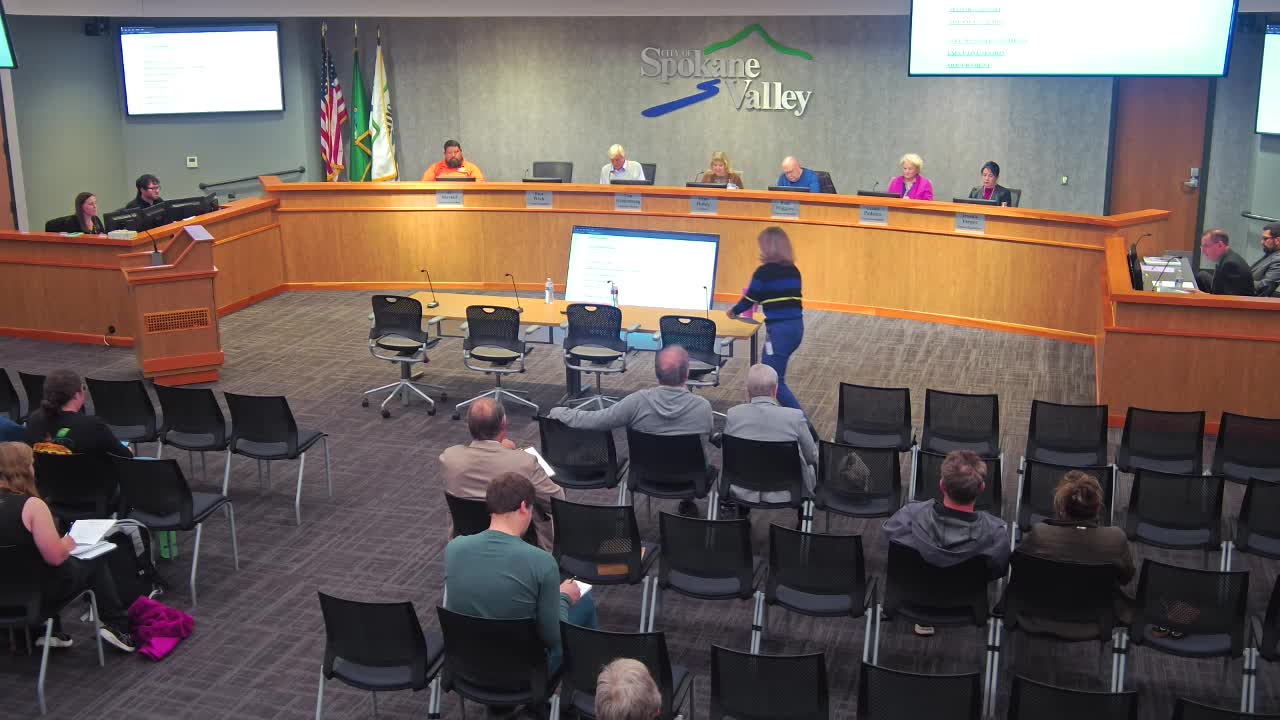Spokane Valley council approves in-house right-of-way agent to speed capital projects
Get AI-powered insights, summaries, and transcripts
Subscribe
Summary
The council voted to reclassify a funded public liaison position into a right-of-way acquisition agent to reduce consultant costs and speed delivery of federally funded projects; one councilmember opposed.
The Spokane Valley City Council on Oct. 14 voted to reclassify a funded public liaison position into a full-time right-of-way acquisition agent and authorized the city manager to implement related organizational and budget changes for 2025–2026.
City Services Administrator Gloria Mance told the council the city lacks in-house staff qualified to manage federally required right-of-way acquisition for capital projects and currently relies on a small pool of consultants. “The city right now has a vacant funded position for a public liaison. We are proposing to reclassify this position to a right away agent,” Mance said. She told the council that the new position would be paid from a mix of the general fund, the stormwater fund and the capital improvements program fund, with grant reimbursements covering most CIP costs.
The move, Mance said, will not increase the city’s authorized headcount and is intended to reduce delays and contractor turnover that have stalled projects. She told council members the city has spent “an average of about $320,000 in the last five years” on consultant fees for right-of-way acquisition work and that an in-house agent should streamline negotiations and shorten delivery timeframes.
City Manager John Holman added that federal right-of-way work requires specially certified professionals and that only a few firms in the region can legally perform the work. “They have to be qualified. They have to be certified to do the work,” Holman said, describing constraints that make consultant capacity inconsistent.
Councilmembers pressed staff on contract protections and workload. Deputy Mayor Hatenberg said having a local, consistent point of contact would improve property-owner trust and reduce rework. Councilmember Patton and others said the position is project-funded and will be reevaluated if the workload declines. Several members also said the in-house option should lower long-term costs compared with repeatedly contracting out the work.
Councilmember Merkel opposed the change, saying he remained unconvinced that hiring in-house resolves contract capacity and staffing turnover problems. Merkel said he did not see how the reclassification would address contractors’ staffing churn or improve procurement outcomes. His concern prompted discussion about whether improved contract terms and key-person provisions could be strengthened instead of hiring a staff position.
The council approved the measure after the debate. The authorization directs the city manager to hire or reclassify the position, implement organizational changes and amend the 2025 and 2026 budgets as necessary.
Implementation details cited at the meeting: the position will be full time, will be funded primarily from restricted transportation and stormwater funding sources and is intended to be reimbursed by federal and state grants where applicable. Staff said the city will continue to include measurable deliverables in consultant contracts and retain the option to terminate nonperforming contracts.
The council’s action follows public comment in which residents asked about the cost, the long-term workload for the position and whether penalties could be added to consultant contracts. During the discussion John Harding asked whether the position would be full time and how salary would be funded; staff responded that salary and benefits are shown in the budget tables and that most of the cost will be covered by restricted CIP and stormwater funds.
Councilmembers said they expect periodic review of the position and that a drop in workload would prompt reassessment.
Votes at a glance: the motion passed with one dissenting vote. The transcript indicates a single councilmember opposed; the council did not record a roll-call list of individual yes votes during the meeting.
Ending: Staff will proceed with reclassification and return any required budget amendments to council for formal adoption as the city finalizes the 2026 budget.
